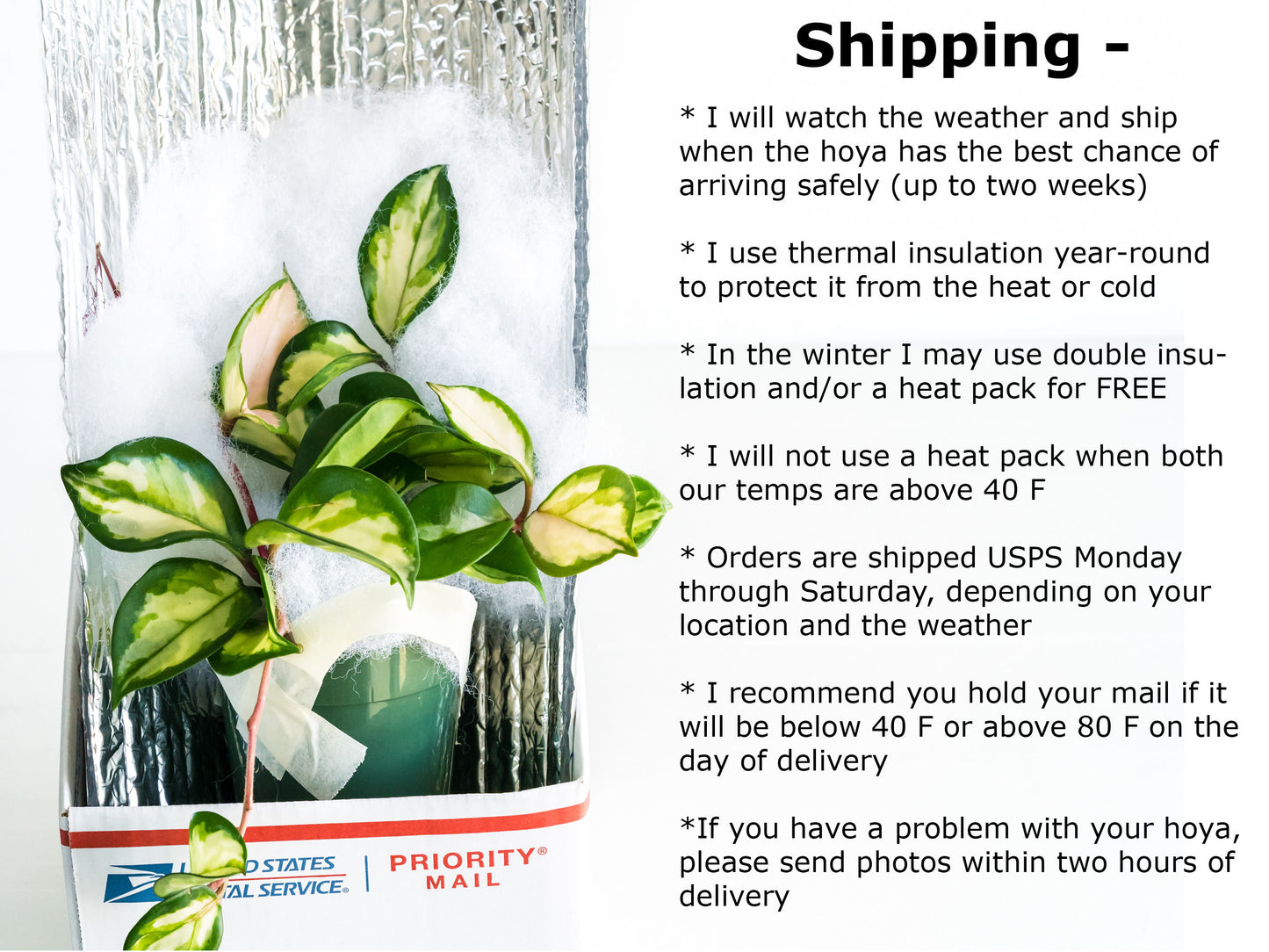Hoya Treasures
Hoya heuschkeliana (Inner Variegated)| 2-Inch
Hoya heuschkeliana (Inner Variegated)| 2-Inch
Couldn't load pickup availability
This Hoya heuschkeliana (Variegata) is a rooted cutting with new growth. They are one of my all-time favorite hoyas because they are beautiful and easy to grow.
I often have large plants on my website so you may want to check out that listing.
*** Exact plant, rooted with new growth, US Seller***
* Click here to read important information about local pickup, general shipping, and winter shipping *
Leaves
The leaves are quite tiny and grow very compactly. The leaves like to grow in bunches and can either be a hanging/trailing plant or it can be trained to go around a trellis. I think it looks the best when it both goes up a trellis and hangs down. Many hoya leaves are thick and rigid and the leaves on these are thicker than you may think, relatively thin for a hoya, but the mature leaves are quite rigid and they would break in two if you tried to bend the leaf. These leaves have a creamy, white inner variegation and are one of my most stable hoyas with variegation.
Flowers
It can take a year or two for the plant to get mature enough to bloom, depending on the size of plant you started with and your growing conditions. The flowers are pink and I'm told smell like buttered popcorn. The blooms on this are quite small, only last a day or two and really aren't that impressive to me. If they are given consistent conditions they will always think it is summer and bloom year-round.
Growth
Like most hoya, they take a while to root and get started growing, but once they do, they grow quite fast for me. I would say they get new leaves every 2-3 weeks.
Soil
I have experimented with different potting mediums over the years for hoyas and this one does fine in any of them. My favorite substrate currently is Lezchuza Pon or a DIY pon mix of 4 parts pumice from my local garden center, 2 parts lava rock, and 1 part zeolite.
Water
A good rule of thumb for all hoyas is to water when the pot feels lighter than when it is moist. It takes a little practice to learn how heavy each pot size normally is but it really is the best method.
Light
The general advice is bright light with no direct sun - but that has never been helpful to me. If you are growing near a window, keep them a few inches away from a south window or directly in a north window to start then move them around if they look like they could use more or less light. I can tell you that I grow mine with the top of the plant about 5-7 inches away from a Barrina T5 grow light for 14 hours a day. I do recommend a light meter so you can check the amount of light. Mine are generally at about 400 foot candles so they get a light sun-stressing but also grow quickly. You can tell it isn't getting enough light if it is leggy, slow growing, starts to lose its variegation, or doesn't get sunstressed and/or pink to red leaves when they first come out.
Humidity and Temperature
These will grow fine in ambient room conditions but will grow faster with higher humidity and temperature. I keep my plant room pretty consistently at 60-65% humidity and 73-78 F and most of my plants love this. You can do higher humidity, but make sure to also increase the temperature relative to the humidity so there is good VPD.
Fertilizer
I add Tezula Plants MSU Fertilizer to my watering can every time I water for three weeks then water with plain water for a week to flush the pon.
When to Repot
These tend to have a relatively small root system and prefer small pots and they take a long time to get root-bound. I would stick with the pot it's in as long as it's happy in it and isn't root-bound. When you do repot, only go up one inch in size. I use these 2-inch pots for all my small hoyas and these 3-inch pots for all my larger ones.
Pests and Disease
I have personally not had a problem with either of these on this plant but I also avoid a lot of these problems but having good soil, light, and humidity conditions and by doing routine pest control.
For my routine pest control I currently rotate weekly between PureCrop (good for all-around killing pests on contact), Horticultural Oil (for flat mites), and AzaMax (liquid systemic that takes about three weeks to start working but will then protect your plant from anything that tries to eat it).
Propagating
I like to take a mature hoya and snip off a long section. Then I cut it into sections with one node to a section, get a small pot full of substrate, stick the cutting in the mix, and keep it consistently moist. The node should not be in the substrate. It's hard to explain in words, so if you don't already know how to propagate hoyas, I would check out some YouTube videos.
If you don't have already at least 60% humidity, you can do something like put it in a take-out container or Rubbermaid box to increase the humidity for a week or two then gradually get it used to regular household humidity once it has a few roots.
Are hoyas toxic to pets?
Good news! They are non-toxic to cats and dogs.
Share




















